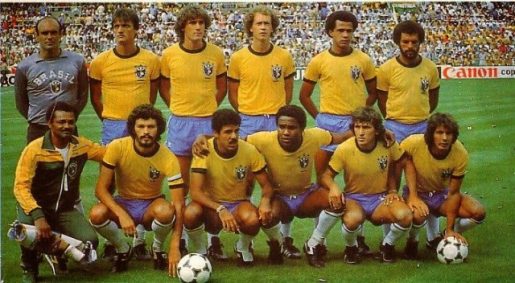July 5 1982. Sarria Stadium, Barcelona: Sixty seven minutes have elapsed in this thrilling second round World Cup match between Italy and Brazil. A place in the semi-finals is at stake and the Italians have a 2-1 lead but the Samba Boys are pushing hard for the equaliser that would take them through.
Sixty seven minutes have elapsed when left back Junior begins another marauding run through the Italian midfield. His pass finds Falcao on the edge of the 18 yard box. The midfielder controls the ball, takes two touches and lashes an unstoppable left foot shot past Dino Zoff to tie the game. Those who saw it need no reminding; it’s the kind of goal that remains etched in the memory forever. If you didn’t, go google it.
What really makes that goal special isn’t so much the power and swerve of Falcao’s finish. And it certainly isn’t because it helped Brazil progress – they would ultimately fall to a third goal from Paolo Rossi.
What makes the goal special is what preceded Falcao’s shot. When Junior’s pass arrives at Falcao’s feet, you can see his midfield partner Cerezo take off from his central position and make an over lapping run past Falcao down the right.
The Italian defence see his run though and react to nullify it. That proves their undoing. Three defenders react, all shifting left and parting like the proverbial Red Sea, thus opening up the space for Falcao to lash his shot through. It’s a thing of beauty. Watch that run and goal https://youtu.be/QgKf5nIRnp4?t=141
Without Cerezo’s decoy run it’s hard to see how Falcao’s shot would have gone through that obdurate Italian defence. It’s the key move in that entire sequence.
But here’s the thing: In today’s increasingly stat-driven football speak, that would go down as a goal for Falcao and an assist for Junior (Nobody spoke of assists back in ’82). And you’d have to dig like hell to find even a mention of Cerezo in the media narrative. Football talk has become overly focused on goals and assists; everything else pales into insignificance.

It’s what the misuse and abuse of statistical data has wrought in the social media age. You know what I’m talking about: How many times have you seen a Tweet or post extolling a player followed quickly by a snide “yeah, but how many goals and assists does he have?” They don’t even have to be strikers! It’s not just goals and assists either; we count and quote everything now: passes, touches, tackles, progressions, pressures, expected goals, expected assists….you name it.
Let’s be clear: There’s nothing wrong with stats. Interpreted correctly and in the right context they can provide a better understanding of player and team performance. They can be a useful analytical tool for player evaluation, coaching and procurement. And they certainly provide the basis for some intelligent discourse on the beautiful game – check out Ted Knutson and Mike Goodman at Statsbomb. They have certainly demonstrated the predictive value of stats done well.
But when numbers are flung around willy-nilly, devoid of understanding or context, often as a tool to compare one player to another, it simply does my head in. Maybe I just spend too much time on social media.
But the key point of the Falcao goal is this: not everything of importance can be counted. And, conversely, not everything that can be counted is important. That Cerezo run is just one example of the many influential actions that can go unseen, uncounted and unappreciated in an age so smitten with stats.
Some are more obvious than others. The other day, I came across a comment condemning Adam Lallana’s “lack of contribution” – no goals no assists – to Liverpool’s cause in the few matches he had featured in since returning from injury. I found that an odd comment from anyone who had seen the West Ham game, in which Lallana somehow escaped the attention of three defenders to find James Milner just before Sadio Mane’s goal.
The goal never happens without Lallana’s two- footed trickery but the assist is Milner’s so Lallana “didn’t contribute”. Against Burnley two weeks ago, Lallana blocked Phil Bardsley’s clearance, leading to another Mane goal. That, too, didn’t count as an assist, so to the stat-judge he “didn’t contribute”.
Then there are the not-so-obvious things. How do you count the number of times a player prevents a pass just by occupying a passing lane or staying close to a target and forcing a different course of action?
It’s hard to count something that didn’t happen. How about when defenders are so well positioned that an attacker decides to pass or turn back rather than shoot? None of those actions involve the player contacting the ball – they have to do with something NOT happening – so they go unseen, uncounted, unappreciated, yet they may be just as important as actually making a tackle or winning a heading duel.
Virgil Van Dijk has tongues wagging this week after the imperious piece of defending he produced at Anfield on Sunday. It was ultimately a poor shot by Moussa Sissoko, but the way van Dijk blocked off his best options – a pass to Heung Min Son and a right foot shot – is exactly the kind of valuable non-contact contribution that too often goes unseen, uncounted and unappreciated.
Except of course that this one was seen and appreciated, and it will be rightly lauded loud and clear. That it was a decisive key intervention in a high profile match guarantees that.
Perhaps all hope is not lost after all.










BRILLIANT! … And I haven’t even read it yet but after skimming thru it shouts what some of us have been saying since Football was taken over by American stats